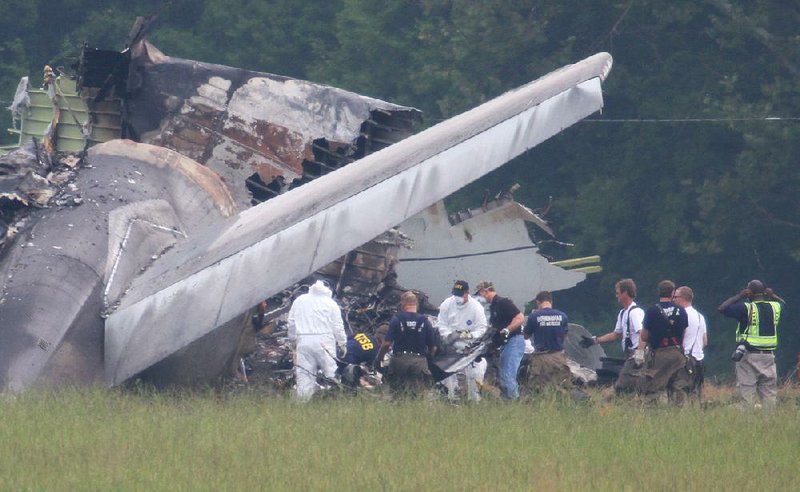The deadly crash of a United Parcel Service Inc. plane that struck a hillside short of an Alabama runway Wednesday is the latest for an air-cargo industry that has experienced many more fatal wrecks than U.S. passenger carriers.
The accident involving Atlanta-based UPS, the world’s largest package-delivery company, was the second with fatalities this year and fourth since 2009 for a U.S.-registered cargo hauler, according to the National Transportation Safety Board.
“Cargo has clearly been treated as a stepchild” by regulators, said Jim Hall, a former safety-board chairman who is a consultant for the Independent Pilots Association, the union representing UPS pilots.
The rate of fatal cargo accidents around the world was eight times higher than on passenger planes from 2002-11, according to a study by the U.K. Civil Aviation Authority published in June.
The UPS plane, an Airbus SAS A300-600F, broke apart and burst into flames while approaching the airport in Birmingham, Robert Sumwalt, a member of the safety board, said at a briefing in Alabama.
The two pilots were killed. Investigators on Thursday recovered the plane’s flight-data and cockpit-voice recorders, safety board spokesman Kelly Nantel said in an email.
The black-box recorders, which will tell investigators what the pilots were saying and provide details about the flight path and any malfunctions, were scheduled to be analyzed starting Thursday night, Nantel said.
Sumwalt said safety board crews had to dig through rubble to find them.
The accident near Birmingham-Shuttlesworth International Airport comes after the crash of a Boeing Co. 747-400 operated by National Air Cargo Group Inc. shortly after takeoff from Bagram Air Base in Afghanistan on April 29. All seven crew members aboard were killed, according to the safety board.
Two UPS pilots died Sept. 3, 2010, in Dubai after a fire broke out in their 747-400 carrying a load of lithium batteries, according to the United Arab Emirates General Civil Aviation Authority.
A crash in Narita, Japan, near Tokyo on March 23, 2009, killed two pilots on a FedEx Corp. MD-11 after a hard landing and fire, according to the AviationSafetyNetwork, a website that tracks aviation accidents.
No U.S.-based passenger carriers have had a fatal accident since Feb. 12, 2009, when 49 people died in a crash near Buffalo, N.Y., of a regional turboprop plane operated by Pinnacle Airlines Corp.’s former Colgan unit, according to the National Transportation Safety Board. A man on the ground also died in the accident.
Three passengers died aboard an Asiana Airlines Inc. plane that crashed short of the San Francisco International Airport runway on July 6.
In Wednesday’s crash, UPS Flight 1354 was en route to Birmingham from Louisville, Ky., the company’s air hub. It flew over a subdivision north of the runway moments before the accident, Sumwalt said.
Photos from the scene showed the plane scorched and the ground strewn with packages from its cargo bay.
Investigators will examine whether the pilots, who were landing shortly before dawn, were suffering from fatigue, John Cox, president of Washington-based Safety Operating Systems and a former airline pilot, said in an interview.
Cargo airlines were exempted from rules mandated by Congress that restrict how many hours passenger-airline pilots can fly, particularly during overnight hours. The rules go into effect in 2014.
The Independent Pilots Association and the Air Line Pilots Association, which represents FedEx pilots, have pushed Congress to enact legislation to require the same standards for cargo pilots.
Because cargo planes don’t carry passengers, accidents kill fewer people and it has been harder to justify expensive safety regulations, Hall said.
“My focus is being sure that we don’t let economic decisions drive safety,” he said.
In addition to operating more flights at night, when fatigue is most prevalent, cargo airlines have other risk factors, such as flying into smaller airports without as many safety protections as larger ones and carrying more dangerous freight, Cox said.
UPS Flight 1354 was landing to the south on the Birmingham’s airport Runway 18, which lacks an instrument-landing system to provide planes with a glide slope guiding them to the runway, according to pilot information website AirNav.com.
Information for this report was contributed by Gigi Douban, Robert Wall and Mary Schlangenstein of Bloomberg News.
Business, Pages 68 on 08/18/2013
